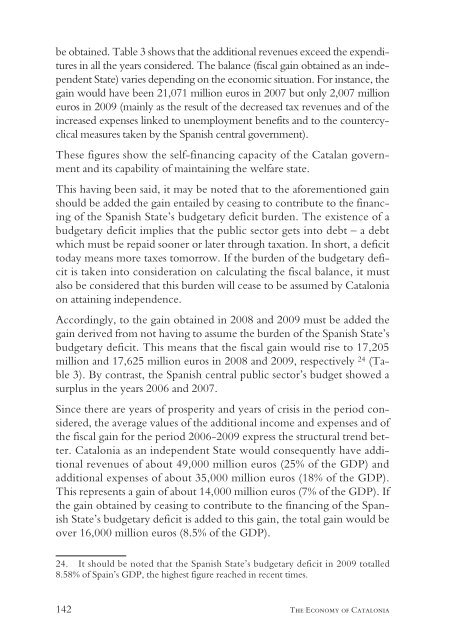The Economy of Catalonia
the_economy_of_catalonia._questions_and_answers_on_the_economic_impact_of_independence
the_economy_of_catalonia._questions_and_answers_on_the_economic_impact_of_independence
Create successful ePaper yourself
Turn your PDF publications into a flip-book with our unique Google optimized e-Paper software.
e obtained. Table 3 shows that the additional revenues exceed the expenditures<br />
in all the years considered. <strong>The</strong> balance (fiscal gain obtained as an independent<br />
State) varies depending on the economic situation. For instance, the<br />
gain would have been 21,071 million euros in 2007 but only 2,007 million<br />
euros in 2009 (mainly as the result <strong>of</strong> the decreased tax revenues and <strong>of</strong> the<br />
increased expenses linked to unemployment benefits and to the countercyclical<br />
measures taken by the Spanish central government).<br />
<strong>The</strong>se figures show the self-financing capacity <strong>of</strong> the Catalan government<br />
and its capability <strong>of</strong> maintaining the welfare state.<br />
This having been said, it may be noted that to the aforementioned gain<br />
should be added the gain entailed by ceasing to contribute to the financing<br />
<strong>of</strong> the Spanish State’s budgetary deficit burden. <strong>The</strong> existence <strong>of</strong> a<br />
budgetary deficit implies that the public sector gets into debt – a debt<br />
which must be repaid sooner or later through taxation. In short, a deficit<br />
today means more taxes tomorrow. If the burden <strong>of</strong> the budgetary deficit<br />
is taken into consideration on calculating the fiscal balance, it must<br />
also be considered that this burden will cease to be assumed by <strong>Catalonia</strong><br />
on attaining independence.<br />
Accordingly, to the gain obtained in 2008 and 2009 must be added the<br />
gain derived from not having to assume the burden <strong>of</strong> the Spanish State’s<br />
budgetary deficit. This means that the fiscal gain would rise to 17,205<br />
million and 17,625 million euros in 2008 and 2009, respectively 24 (Table<br />
3). By contrast, the Spanish central public sector’s budget showed a<br />
surplus in the years 2006 and 2007.<br />
Since there are years <strong>of</strong> prosperity and years <strong>of</strong> crisis in the period considered,<br />
the average values <strong>of</strong> the additional income and expenses and <strong>of</strong><br />
the fiscal gain for the period 2006-2009 express the structural trend better.<br />
<strong>Catalonia</strong> as an independent State would consequently have additional<br />
revenues <strong>of</strong> about 49,000 million euros (25% <strong>of</strong> the GDP) and<br />
additional expenses <strong>of</strong> about 35,000 million euros (18% <strong>of</strong> the GDP).<br />
This represents a gain <strong>of</strong> about 14,000 million euros (7% <strong>of</strong> the GDP). If<br />
the gain obtained by ceasing to contribute to the financing <strong>of</strong> the Spanish<br />
State’s budgetary deficit is added to this gain, the total gain would be<br />
over 16,000 million euros (8.5% <strong>of</strong> the GDP).<br />
24. It should be noted that the Spanish State’s budgetary deficit in 2009 totalled<br />
8.58% <strong>of</strong> Spain’s GDP, the highest figure reached in recent times.<br />
142 <strong>The</strong> <strong>Economy</strong> <strong>of</strong> <strong>Catalonia</strong>


